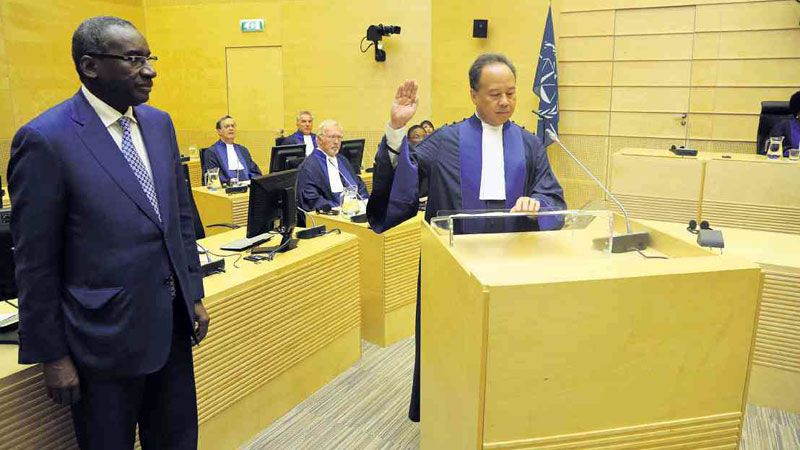
SWORN IN AS ICC JUDGE Inquirer publisher and former dean of the University of the Philippines College of Law Raul Pangalangan is sworn in as a judge of the International Criminal Court (ICC), in ceremonies held on Monday at the ICC headquarters at The Hague in the Netherlands. In a statement posted on the ICC website Tuesday, Pangalangan swore before the Assemblies of States Parties president and Senegal minister of justice Sidiki Kaba (left), to undertake his duties at the ICC “honorably, faithfully, impartially and conscientiously.” ICC-CPI
Inquirer publisher Raul Pangalangan has been sworn in as a judge of the International Criminal Court (ICC) in ceremonies at The Hague in the Netherlands.
Pangalangan, a former law dean of the University of the Philippines, made a solemn oath in open court on Monday before Senegal Justice Minister Sidiki Kaba, president of the Assembly of States Parties, the ICC’s governing body, according to a statement posted on the ICC website on Tuesday.
“I solemnly undertake that I will perform my duties and exercise my powers as a judge of the International Criminal Court honorably, faithfully, impartially and conscientiously, and that I will respect the confidentiality of investigations and prosecutions and the secrecy of deliberations,” Pangalangan said in the oath he recited.
In welcoming Pangalangan to the court, Kaba said: “[You are] joining the small and prestigious group of eminent judges who have the formidable honor and difficult responsibility of putting into practice the spirit and the letter of the Rome Statute.”
Rome Statute
The ICC is an intergovernmental organization and international tribunal that sits in The Hague. It has the jurisdiction to prosecute individuals for the crimes of genocide, crimes against humanity and war crimes.
The Rome Statute is the international treaty which is the ICC’s foundational and governing document. There are currently 123 states that have acceded to the Rome Statute and are therefore members of the ICC.
Kaba said the ICC sought “to deliver justice on behalf of the peoples of the world and to ensure that the most serious crimes affecting the international community as a whole do not go unpunished.”
“You thus have an historic opportunity to play a part in the establishment of sound case law, the cornerstone of justice that is recognized and accepted,” he told Pangalangan.
ICC President Judge Silvia Fernández de Gurmendi praised Pangalangan’s long history of involvement with the ICC and his commitment to international criminal justice.
“I have no doubt that Dr. Pangalangan will make an important contribution to the work of this court. I hope this will encourage more Southeast Asian states to join the ICC, and to become members of a global system to punish and help prevent the most serious crimes of concern to the international community as a whole,” Fernández said.
Pangalangan, who remains the Inquirer publisher, was elected to fill the seat vacated by Sen. Miriam Defensor-Santiago, the first Filipino and Asian to be elected a judge of the ICC.
Santiago was elected in December 2011 but resigned on June 3, 2014, after she contracted lung cancer. Her nine-year term would have started in March 11, 2012. Pangalangan will hold office until 2021.
Those who attended Pagalangan’s swearing-in were the ICC judges, ICC deputy prosecutor James Stewart and ICC registrar Herman von Hebel, together with a number of diplomats and representatives of other international organizations in The Hague and members of civil society.
The International Criminal Court has a bench of 18 judges who are nationals of states parties to the Rome Statute.
According to the ICC website, judges are chosen from among “persons of high moral character, impartiality and integrity who possess the qualifications required in their respective countries for appointment to the highest judicial offices.”
“The election of the judges takes into account the need for the representation of the principal legal systems of the world, a fair representation of men and women, and equitable geographical distribution,” the ICC said.
RELATED STORIES
PDI publisher elected judge of int’l crime court at The Hague
Sereno, Leonen hail Pangalangan’s election as ICC judge